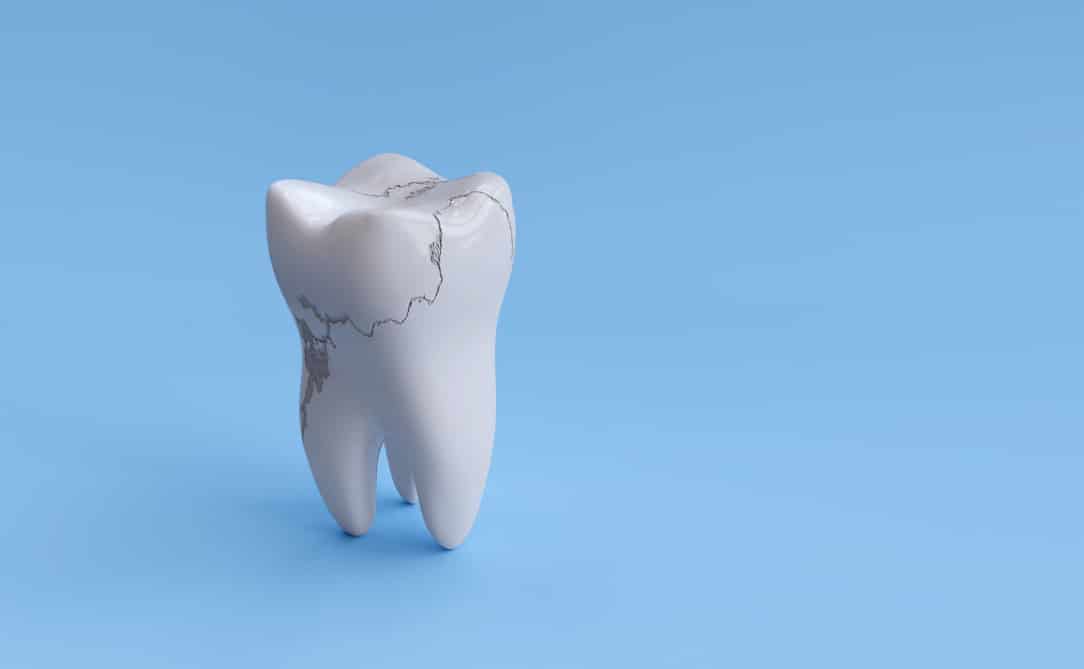
It can be hard for you to tell if a tooth is cracked. If you have pain, you may not be able to tell which tooth hurts or even whether the pain comes from the top or bottom of your mouth. Cracks may be invisible to the eye and m ay not even show on an x-ray. And sometimes you won’t have any pain or sensitivity at all; your dentist will discover it during your exam.
If you are having symptoms you can help your dentist find the cracked tooth by sharing some information:
Related Article: Do You Have Sensitive Teeth? Symptoms, Causes, and Treatments
A tooth may crack for many reasons, such as:
Related Article: Stress Affects Oral Health: Are You Clenching or Grinding While You Sleep?
Pulp is the soft tissue inside the center of your tooth and contains nerves and blood vessels. If the crack reaches the pulp, your tooth may be sensitive to hot and cold. Sometimes, a crack in the enamel of your tooth goes all the way down to the nerve pulp. This type of cracked tooth may hurt when you bite down or when you stop biting. The crack may be too small to see , but is large enough for the pulp inside your tooth to become irritated.
When your tooth is cracked the pulp sometimes becomes infected. If this happens, treatment to remove the pulp, also known as a root canal, may be needed to save your tooth.
Related Articles:
Toothache Causes: Why Do I have Tooth Pain and How Can I Get Relief?
The Number 1 Reason People Visit the Dentist: Tooth Pain!
Sometimes, a person may be disregarding the symptoms for quite a while. After all, it takes some time for this type of infection to take root. That’s why it’s important to schedule regular dental exam appointments.
In other cases, a person may show no symptoms.
IMPORTANT: if you’re experiencing tooth pain, call to schedule an appointment with Dr. Roberts immediately!!
If you’d like to learn more check out our article: Everything You Want to Know about Root Canal Treatment
Treatment depends on the size, location, and direction of the crack, as well as your symptoms. It is possible that your dentist will recommend no treatment at all, since tiny cracks are common and usually do not cause problems. You and your dentist can talk about the types of treatments for your tooth and decide on the treatment that is right for you.
Related Articles:
When tooth decay becomes severe, a root canal is often the first treatment option. However, if the infection persists after a root canal, extraction would be the next stage. This will stop the spread of infection. Risk of infection is another reason for tooth extraction. If your immune system is compromised, risk of infection may lead to extraction of a tooth.
More about tooth extraction from WebMD HERE.
There are two types of tooth extractions – surgical and nonsurgical.
However, often, gum tissue and bone may need to be removed to extract a tooth – this is surgical extraction. By taking an X-Ray and examining your tooth, your dentist or oral surgeon can determine whether simple or surgical extraction is needed. Before a surgical tooth extraction, you will be given a local or general anesthetic to numb the area. This will eliminate the pain while your dentist removes the tooth. Once the tooth is extracted, stitches are sometimes used to close the gum edges. Since surgical extractions are so common, there is nothing to worry about!
A tooth that is cracked can be painful. It also can lead to disease of the tooth. If you think you have a cracked tooth, remember to look for these signs and call our office to schedule an emergency dental appointment:
Our goal is to fix any dental emergency as soon as possible and get you back on your feet and out of pain. Accidents can happen, and quick action and knowledge of dental emergencies can easily save a tooth! Make sure to give us a call at Adams Dental as soon as you experience the signs of a dental emergency.
Learn more from this Dental Emergency FAQ.
These are clear signs of dental emergencies, due to injury:
While these signs are often correlated to a dental emergency, there are other signs and symptoms to also be aware of that aren’t as sudden or apparent. Symptoms such as prolonged pain, or a swollen jaw are major indicators that something isn’t right, even if they do seem more subtle.
Let’s review a couple of Healthy Smile Tips:
Remember to schedule your dental exam and cleaning, because it will help Dr. Roberts find and treat problems at an early stage. A cracked tooth can become a bigger problem if left untreated. If you think you may have a cracked tooth, please call to schedule an appointment at 913-296-8030.
Local dentist, Travis A. Roberts and his experienced, friendly team at Adams Dental Group offer affordable family dentistry and gentle dental care in the Kansas City, KS area. We have two locations that are conveniently located and offer appointment times Monday through Friday to meet your needs. At Adams Dental Group, we provide most dental services, from family and general dentistry to specialty procedures, including dental implants, dentures, endodontic or root canal treatment, teeth whitening, cosmetic dentistry and much more. We accept most dental insurance plans and offer affordable financial solutions for any budget. Call us at our West location (913) 296-8030 or our East location (913) 621-3113 to schedule an appointment.
Dr. Travis A. Roberts, DDS August 30th, 2021
Posted In: Emergency Dental Care
Tags: broken tooth, dental crown, dental exam, root canal